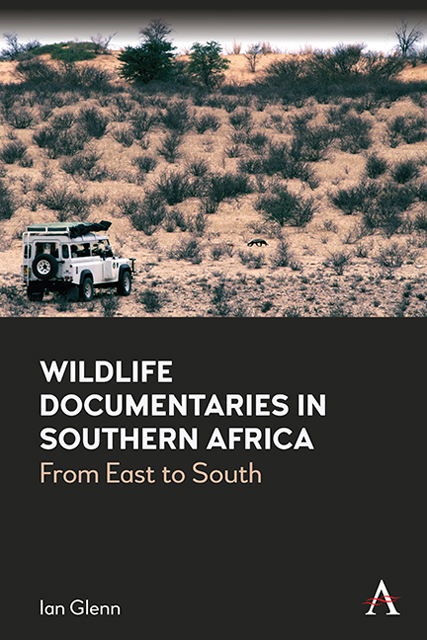Book contents
- Frontmatter
- Dedication
- Contents
- List of Figures
- Acknowledgements
- Introduction
- Chapter 1 What do the Critics Say?
- Chapter 2 A Theoretical Coalition?
- Chapter 3 Gone South: From East to Southern Africa
- Chapter 4 Private Lodges, Infrastructures and Guides
- Chapter 5 Going South: The Results
- Chapter 6 The Early History
- Chapter 7 The South Africans Enter the Game
- Chapter 8 Michael Rosenberg and Partridge Films
- Chapter 9 David and Carol Hughes
- Chapter 10 The Bartletts in the Namib, the Liversedges in Botswana
- Chapter 11 John Varty, Elmon Mhlongo and Londolozi
- Chapter 12 Richard Goss and Kim Wolhuter
- Chapter 13 Dereck and Beverly Joubert
- Chapter 14 Other Major Contributors
- Chapter 15 Going Live: Africam And Wildearth
- Chapter 16 Craig and Damon Foster
- Chapter 17 Must Love Animals?
- Chapter 18 The Social Turn
- Chapter 19 The Future of the Genre
- Chapter 20 The Influence of the Genre
- Conclusion
- Filmography
- Plates
- References
- Index
Chapter 12 - Richard Goss and Kim Wolhuter
Published online by Cambridge University Press: 10 January 2023
- Frontmatter
- Dedication
- Contents
- List of Figures
- Acknowledgements
- Introduction
- Chapter 1 What do the Critics Say?
- Chapter 2 A Theoretical Coalition?
- Chapter 3 Gone South: From East to Southern Africa
- Chapter 4 Private Lodges, Infrastructures and Guides
- Chapter 5 Going South: The Results
- Chapter 6 The Early History
- Chapter 7 The South Africans Enter the Game
- Chapter 8 Michael Rosenberg and Partridge Films
- Chapter 9 David and Carol Hughes
- Chapter 10 The Bartletts in the Namib, the Liversedges in Botswana
- Chapter 11 John Varty, Elmon Mhlongo and Londolozi
- Chapter 12 Richard Goss and Kim Wolhuter
- Chapter 13 Dereck and Beverly Joubert
- Chapter 14 Other Major Contributors
- Chapter 15 Going Live: Africam And Wildearth
- Chapter 16 Craig and Damon Foster
- Chapter 17 Must Love Animals?
- Chapter 18 The Social Turn
- Chapter 19 The Future of the Genre
- Chapter 20 The Influence of the Genre
- Conclusion
- Filmography
- Plates
- References
- Index
Summary
Introduction
The careers of Richard Goss and Kim Wolhuter and the collaborations between them help illustrate the continuity of a Southern African wildlife film tradition and its ongoing developments and innovations. Goss’s first involvement in wildlife film was as a scientific advisor on an early Partridge Fragile Earth production, Kalahari, Wilderness without Water (1983), produced by Phil Agland with photography by Anthony Bannister and Goss. Goss explains that though he was brought on as scientific advisor, Bannister was unavailable for much of the shoot because of the illness of a child, so that he took over most of the filming.
This film arguably had more influence than the other films in the series. The first is that it established Goss as a leading filmmaker and indirectly helped develop Wolhuter’s career. The second is that it introduced meerkats to the wildlife viewing public. Kalahari begat Meerkats United (1987) which, as Tim Clutton-Brock admits, begat Meerkat Manor (Clutton-Brock 2007, 15). The third is that it marked a ground-breaking attempt to film predators at night. A fourth was that it showed intriguing sequences of honeybadger behaviour and probably led to Colleen Begg coming to do her PhD in the area with Gus Mills as supervisor.
Goss drew on the work of two scientists doing ground-breaking work in the area: Gus Mills, attached to SANParks, doing an MSc on brown hyenas; and David Macdonald of Oxford University working on meerkats. Mills, with long experience in the area, and an award-winning wildlife photographer himself provided a general outline of what to film to Partridge (e-mail, 28 October 2021), and no doubt guided Goss to some of the most intriguing sequences: a brown hyena eating melons; or a honey badgers hunting a gecko under the bark of a tree (Mills 2010).
Macdonald was working with habituated meerkats and though they played only a minor role in Kalahari, they were central to Meerkats United (1986) which became one of the BBC’s most popular and successful wildlife films ever. Attenborough’s narration and the football club analogy played some part in the success of this film, but Goss’s innovative camerawork was the major factor. Goss also worked with Macdonald to film episode 7 of Velvet Claw (1992) that focused on meerkats.
- Type
- Chapter
- Information
- Wildlife Documentaries in Southern AfricaFrom East to South, pp. 161 - 168Publisher: Anthem PressPrint publication year: 2022

